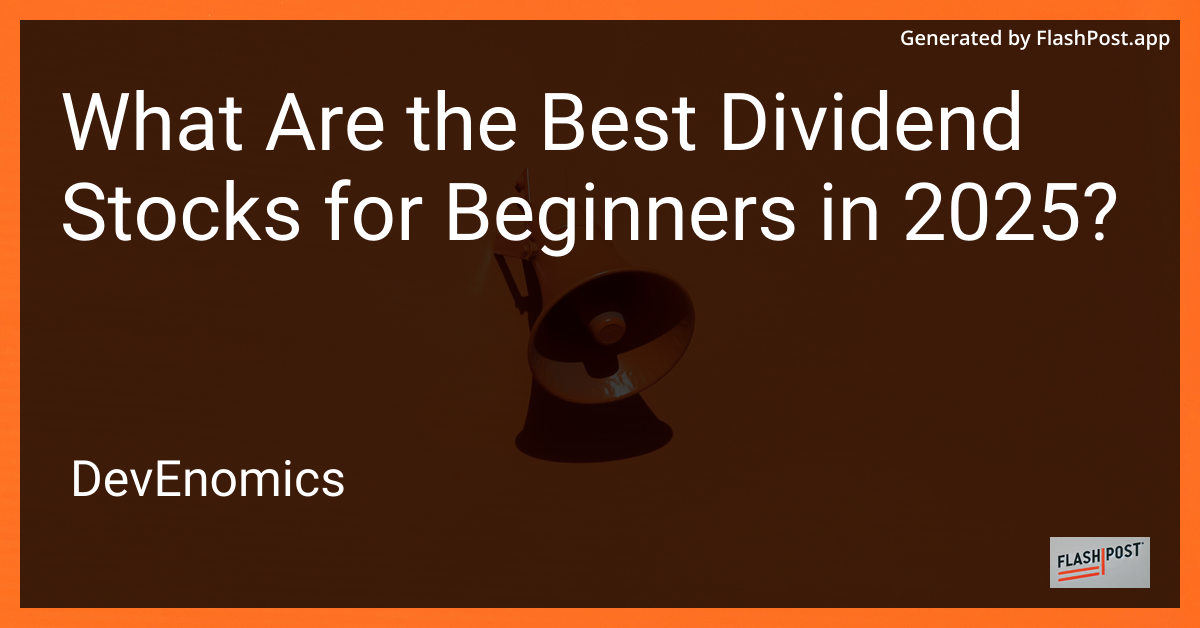

What Are the Best Dividend Stocks for Beginners in 2025?
Investing in dividend stocks is a strategy that can provide a stable income stream while also offering the potential for capital appreciation. For beginners, selecting the right dividend stocks is crucial to building a strong financial foundation. In 2025, some stocks stand out as excellent choices for those new to dividend investing. This article explores these options, offering insights into why they are well-suited for beginners.
What Are Dividend Stocks?
Dividend stocks are shares in a company that distribute a portion of the company’s earnings to shareholders regularly. These payouts are usually in the form of cash and are typically distributed on a quarterly basis. Companies that offer dividends are often more established and provide steady cash flow, making them attractive to investors seeking lower risk.
Benefits of Dividend Stocks for Beginners
- Regular Income: Dividend stocks provide a consistent cash flow, which can be especially beneficial for those looking to supplement their income.
- Lower Volatility: Companies that offer dividends tend to be more mature and stable, providing less volatility compared to high-growth stocks.
- Compounding Returns: Reinvesting dividends can lead to compounded returns over time, significantly enhancing long-term portfolio growth.
Considerations Before Choosing Dividend Stocks
Before diving into the best dividend stocks for 2025, it’s important to understand how to evaluate these investments. Here are a few factors to consider:
- Dividend Yield: This is the annual dividend payment divided by the stock’s price. A higher yield can be attractive, but it may also indicate potential risk.
- Payout Ratio: This ratio indicates what percentage of earnings are paid out as dividends. A lower payout ratio usually implies sustainability.
- Company Stability: Look for companies with a solid history of dividend payments and stable financial health.
For more detailed insights on evaluating dividend stocks, check out evaluating dividend stocks.
Best Dividend Stocks for Beginners in 2025
Here are some of the top dividend stocks to consider in 2025:
1. Apple Inc. (AAPL)
Dividend Yield: ~0.60%
Apple is a tech giant known for its innovation and strong brand presence. Although its dividend yield isn’t as high as traditional dividend stocks, its consistent performance and robust financials make it a reliable choice for beginners.
2. Coca-Cola Co. (KO)
Dividend Yield: ~3.20%
Coca-Cola has a long history of dividend payments and is part of the esteemed group known as “Dividend Kings” due to its 50+ years of consecutive dividend increases. It’s a staple choice for those seeking defensive stocks with stable returns.
3. Johnson & Johnson (JNJ)
Dividend Yield: ~2.90%
Johnson & Johnson is a healthcare giant with a diversified product line. It’s famed for its resilience and consistent dividend payouts, making it a cornerstone for many dividend portfolios.
4. Procter & Gamble Co. (PG)
Dividend Yield: ~2.40%
Known for its consumer goods, Procter & Gamble has been a reliable dividend payer for decades, making it an excellent choice for beginners seeking steady income.
5. Realty Income Corp. (O)
Dividend Yield: ~4.70%
Also known as “The Monthly Dividend Company,” Realty Income offers the unique appeal of monthly dividend payments. As a real estate investment trust (REIT), it focuses on high-quality properties with long-term leases.
How to Screen for Dividend Stocks
Choosing the best dividend stocks requires careful screening and analysis. Beginners should utilize tools and resources that help in identifying quality dividend-paying companies. For more information on how to screen dividend stocks effectively, visit these helpful resources:
Conclusion
For beginners, investing in dividend stocks can be an excellent way to gain exposure to the stock market while minimizing risks. The stocks highlighted in this article offer a blend of stability, growth potential, and regular income, making them ideal candidates for a beginner’s portfolio in 2025. Always remember to conduct your due diligence and consider your financial goals before making investment decisions.
